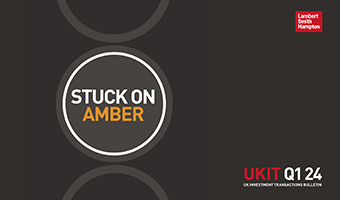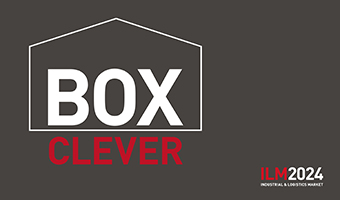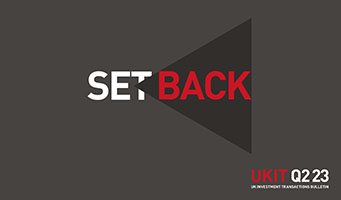Despite increasing economic and geopolitical headwinds, investment volume in Q1 was narrowly short of the previous quarter’s six-year high, according to Lambert Smith Hampton’s latest UK Investment Transactions (UKIT) report.
Amid concerns over the cost of living crisis and the conflict in Ukraine, the UK investment market demonstrated clear resilience in the first quarter. £16.7bn of property assets changed hands during Q1 2022, just 3% shy of Q4 2021’s six-year high of £17.3bn. Notably, despite the outbreak of the war in Ukraine in late February, activity was consistent throughout Q1, with volume in March comparable with each of the previous months.
However, the market was somewhat thinner from a deals perspective compared with 2021, arguably reflected greater caution at the smaller, more typically leveraged, end of the market. The prevalence of major deals was key to Q1’s resilient outturn, with a substantial 19 transactions in excess of £200m. Thus, while Q1 volume was 23% above the five-year quarterly average, the number of recorded deals was actually 13% below trend and the lowest seen since Q4 2020.
Despite substantial price increases over the past 12 months, the boom in the industrial and logistics sector shows little sign of abating and once again played a major part in Q1’s strong overall showing. Volume hit £3.2bn in Q1, 24% down on the colossal record of £4.3bn in the previous quarter but nonetheless among the strongest quarters on record.
Strong as industrial volume was in Q1, the composition of activity differed from recent trends. At £1.6bn, distribution warehousing volume was relatively strong but tame by recent standards, likely linked to a lack of available stock. In contrast, South East multi-let estates boasted record volume of £770m in Q1, with the stand-out deal being US investor Boreal’s £108m purchase of Nucleus, Park Royal, which reflected a highly reversionary yield of 1.83%.
On face value, total office volume of £5.2bn in Q1 appeared healthy, given ongoing uncertainty around future occupancy strategies in the wake of the pandemic. However, while Q1 office volume was 6% above average, activity was relatively thin and skewed by a flurry of major deals in Central London.
The capital was home to both of Q1’s two largest investment deals, namely Google's £762.5m (NIY 3.91%) acquisition of Central St Giles, WC2 from Mitsubishi Estate Company and Ho Bee Land's £718m (NIY 3.98%) acquisition of The Scalpel, EC3 from WR Berkley Corporation. Activity was subdued outside Central London, with Q1 volume for South East offices and Rest of UK offices standing 35% and 62% below trend respectively.
While offices boasted the quarter’s largest deals, arguably the most striking headline in Q1 was the record volume seen in the rapidly emerging private rented residential sector. Investment hit a massive new high of £1.7bn in Q1, more than ten times that of the previous quarter and three times the trend level. Among the more prominent residential deals included Pension Insurance Corporations’ £130m forward funding of Wirral Waters, a 500 unit build to rent (BtR) scheme in Birkenhead.
Another feature of Q1 activity was the ongoing revival of investment interest into the retail sector, where total volume climbed to a four-year high of £1.9bn. However, reflecting ongoing improving sentiment towards the out of town occupier market, investors were heavily focused on retail warehousing, with Q1 volume surging to hit a 15-year high of £1.3bn. The headline deal in Q1 was LaSalle IM’s £600m portfolio purchase of Cheshire Oaks and Swindon Designer Outlet from Nuveen Real Estate.
Overseas buying has recovered strongly over recent quarters, partly reflecting the gradual unwinding of COVID-19-related restrictions across much of the globe. Overseas volume climbed to £8.5bn in Q1, 27% above the five-year quarterly average and its highest level since the pandemic first impacted two years ago. Overseas volume was dominated by North American investors, with record inflows of £5.2bn in Q1, predominantly targeting Central London offices and distribution warehouses.
Meanwhile, volumes contrasted significantly among the key types of domestic investors in Q1. The new year brought a substantial improvement in institutional appetite, with total purchases of £3.2bn in Q1, the strongest since Q4 2017 and 32% above trend. REITS invested £1.7bn in Q1, 17% above the quarterly average, but paling in comparison to the record £3.7bn in the previous quarter.
The All Property average transaction yield was broadly stable in Q1, moving out by just 2bps from the previous quarter to stand at a near 14-year low of 5.21%. However, there were contrasting underlying movements between sectors. Reflecting intense competition, the average industrial yield sharpened to an all-time low of just 3.53%, while average retail yields moved out by 34bps to 6.99%, arguably indicative of increasing appetite for higher yielding product.
Ezra Nahome, CEO of Lambert Smith Hampton, commented:
“In the face of increasing economic and geopolitical headwinds, the UK investment market demonstrated extraordinary resilience in Q1, certainly with regard to volume, less so activity. Moreover, even as the world watched in dismay at the unfolding events in Ukraine, activity held up throughout the quarter.
“Admittedly, the near-term outlook has darkened somewhat and investors will have to carefully navigate a period of higher than anticipated inflation and rising borrowing costs over the rest of the year. However, the fundamentals in the market remain broadly sound and there remains a substantial global weight of money seeking the relative security associated with UK real estate.
“Limited headroom for further yield compression means income will be absolutely crucial in driving returns moving forward. Positively, rental growth prospects remain healthy in some parts of the market, not least industrials, albeit investors should be mindful of affordability constraints. Meanwhile, signs of stabilisation in the retail occupier market will increasingly entice yield-seeking buyers into the sector, even if talk of a resumption in rental growth remains off the agenda for now.”
Get in touch


Email me direct
To:
REGISTER FOR UPDATES
Get the latest insight, event invites and commercial properties by email







